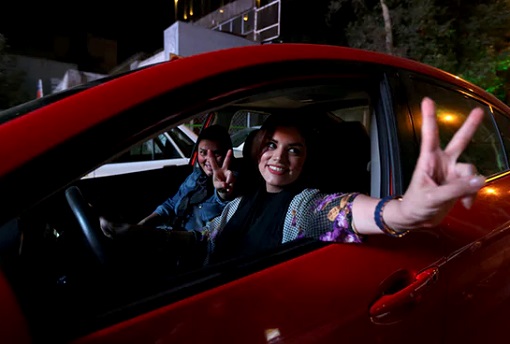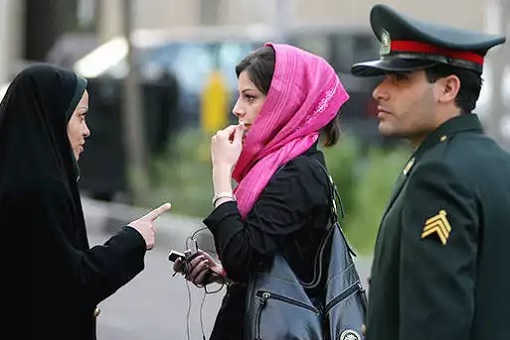In certain countries, women would go to night club to let their hair loose, especially on Friday night after a stressful week. In Iran, however, women could only let their hair loose in cars. But even doing that could land the hot and beautiful Iranian chicks in trouble. Since the 1979 Iranian Revolution, women are obliged to wear hijab or headscarves – even while driving.
Forget Saudi Arabia, Iran’s arch-rival. In Saudi, women are not even allowed to drive. So Muslim women in certain Muslim-majority countries (such as Malaysia) who blindly worship and follow Saudi’s Wahhabism should be careful of what they wish for. In Iran, the women are fighting for their freedom. They are refusing to wear a hijab while driving.
What’s the problem here? The problem is the judiciary and the police think a car interior is a public space. But Iranian women think otherwise and believe that a car is a private space where they can dress more freely, including letting their hair loose. That would mean letting the headscarves rest on their shoulders instead of on their heads, but the police aren’t happy.

Iranian police have been regularly stopping these women drivers, fining them or even temporarily seizing their vehicle. In the summer when temperatures rise, so do the clashes between women and the so-called Iran’s morality police – the Gasht-e Ershad (Persian for Guidance Patrols). They are empowered to admonish suspects, impose fines or arrest members of the public.
Like Gestapo, the secret police of Nazi Germany, the morality police – simply known as “Ershad” – are feared (and despised) by women; so much so that there’s an Android app to help young fashion conscious Iranians avoid the country’s notorious police. Just like Malaysian traffic police who love to hide behind trees before springs into action, Ershad does the same.
Ershad’s mobile checkpoints usually consist of a van, a few bearded men and one or two women in black chadors. They are deployed in towns across Iran and appear with no notice. The Android app – “Gershad” – however, will alert users to checkpoints and help them to avoid them by choosing a different route, frustrating the Ershad.
![]()
The designers of Gershad app has claimed that in 2014 alone, around 3-million people were issued with official warnings, 18,000 were prosecuted and more than 200,000 were made to write formal pledges of repentance. Obviously the app is a lifesaver for the growing numbers of young Iranians who are pushing the boundaries of what they believe is extreme monitoring.
In retaliation to the Gershad app, Tehran went on to unleash a new unit of 7,000 undercover agents, deployed to report suspected transgressions to the police. In February this year, the Ershad increased their level of brutality when a 14-year-old Iranian girl was beaten and detained for wearing “ripped jeans”. She was apparently pulled up after celebrating her birthday with friends.
Now that the same group of Iranian Gestapo insists that women have no privacy even inside cars, all hell breaks loose. Iranian women increasingly refuse to wear hijab while driving. In fact, many in Iran, including men, believe that private space includes the inside of a car. The authorities and the police, however, have opposed such interpretation.

In their desperation to argue the case, Hadi Sadeghi, the deputy head of Iran’s judiciary chief, said last week – “The invisible part of the car, such as the trunk, is a private space, but this does not apply to the visible parts of the car.” His idiotic argument have, of course, invited criticism and mocking. One took to twitter and posted a satirical photo showing a couple embracing in a car boot.
Another social media user mocked – “The police have said that only the boot is a private space … poor those of us who have a hatchback car (without a boot) … we don’t have any private space.” Even mainstream news media, usually kept silence over the mandatory hijab rules, couldn’t help with the amusing debate over what constitutes a private space.
State Irna news agency published an opinion from Hossein Ahmadiniaz, a lawyer, that infringing on people’s private spaces was like infringing their citizen’s rights, arguing that it was up to parliamentarians to define the private space and not the police. He said – “The law says that the space within a car is a private space.”

In fact, according to Bahman Keshavarz, a leading lawyer, the wearing of a so-called “bad hijab” (loose hijab) is not a crime under Iranian law. Even a conservative cleric – Abolfazl Najafi Tehrani – tweeted – “People’s cars, like people’s houses, are their property and a private space and infringing upon this space will disturb people’s moral security and will harm women’s trust with the police.”
Some members of the Iranian parliament agreed that the space within people’s cars is a private space and the police have no right to enter that space without a judicial order. Heck, even President Hassan Rouhani has expressed opposition to the Ershad’s way of handling the issue. But if the Iranian government too couldn’t justify the secret police’s brutality, why are they allowed to continue terrorizing Iranian women?
Iranians knew that the real power is not in the hands of Mr. Rouhani, but in another man’s hand. That hand belongs to Supreme Leader Ayatollah Ali Khamenei, the man the morality police answer to. But it appears that unlike Saudi women, Iranian women are more daring in fighting for their right, or rather the very little freedom they have inside their own cars.

Of course, there’re two sets of rules in Iran. The rich and powerful Iranian women are not subject to Ershad Gestapo’s mistreatment and brutality. They’re the untouchable. And some of them were exposed as – the hidden lives of the rich kids of Tehran.
Other Articles That May Interest You …
- Arabs Played By America – How Trump Sucks Billions Of Dollars Selling Weapons
- Trump’s First War – Iran Could Be The First Muslim Country To Be Hit
- Trump Was Right To Ban 7 Muslim Countries – Kuwait Bans 5 Of Their Brothers Too
- U.S. Held Hostage – Obama Secretly Sent A Plane Of $400 Million Cash To Iran
- Iran The Cheater – Women’s Football Team Are Mostly MEN
- Forget About Nuclear Deal – Iranians Want iPhone & McDonald’s
- Victory For Women In Saudi Arabia – They Can Now Drive But …
- Exposed – The Hidden Lives Of The Rich Kids Of Tehran

|
|
July 15th, 2017 by financetwitter
|


|

|

|

|

|

|




























Comments
Add your comment now.
Leave a Reply